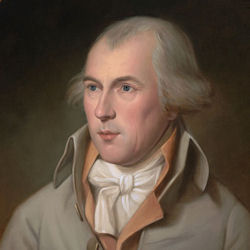James Madison
 Fourth President of the United States. Born at Port Conway, Virginia,.March 16, 1751. Died at Montpelier, Hanover County, Va., June 28, 1836. Graduated at Princeton College 1771. Lawyer and writer. Delegate to Congress 1780-83 and to Constitutional Convention 1787. Became prominent in the issuancy of paper money. Championed the compromise for the adoption of the Constitution of the United States. Member of Congress from Virginia 1789-97. Secretary of State 1801-09. Elected President of the United States as Democratic candidate with George Clinton of New York as Vice-President 1808. Re-elected President 1812, with Elbridge Gerry as Vice-President. War President. At the burning of Washington, D. C, by the British under Gen. Ross, planned the flight of the Government and Cabinet from the Capital with Gen. W. H. Winder 1814. Was associated with Jay and Hamilton in the publication of the Federalist. Buried Montpelier, Hanover County, Va.
Fourth President of the United States. Born at Port Conway, Virginia,.March 16, 1751. Died at Montpelier, Hanover County, Va., June 28, 1836. Graduated at Princeton College 1771. Lawyer and writer. Delegate to Congress 1780-83 and to Constitutional Convention 1787. Became prominent in the issuancy of paper money. Championed the compromise for the adoption of the Constitution of the United States. Member of Congress from Virginia 1789-97. Secretary of State 1801-09. Elected President of the United States as Democratic candidate with George Clinton of New York as Vice-President 1808. Re-elected President 1812, with Elbridge Gerry as Vice-President. War President. At the burning of Washington, D. C, by the British under Gen. Ross, planned the flight of the Government and Cabinet from the Capital with Gen. W. H. Winder 1814. Was associated with Jay and Hamilton in the publication of the Federalist. Buried Montpelier, Hanover County, Va.
James Madison was born in 1751 in King George County, Virginia, where his mother was visiting her family. They soon returned home to Montpelier, which had been in the Madison family since 1723. He helped frame the Virginia Constitution in 1776, served in the Continental Congress, and was a leader in the Virginia Assembly. Madison was instrumental in the calling of the Constitutional Convention of 1787, where he served on key committees and was a tireless advocate of a strong central government. His Virginia plan was the model for much of the Constitution. He also played a critical role in shepherding the document through the Continental Congress.
From 1787 to 1788, Madison along with Alexander Hamilton and John Jay wrote a series of essays that were a major contribution to the ratification of the Constitution. Later published in book form as The Federalist, the essays continue to be studied as classics in political theory. In later years, however, when people called him the "Father of the Constitution," Madison always protested that the document was not "the off-spring of a single brain," but "the work of many heads and many hands."
As a member of the United States House of Representatives from 1789 to 1797, Madison helped frame and pass the Bill of Rights, the first 10 amendments to the new Constitution. During these years, he lived in Philadelphia, then the capital. He met and married Dolley Payne Todd there in 1794. In 1797, they returned to Montpelier where they lived with his parents. Between 1797 and 1801, Madison added a new matching wing to the north end of the house. The two-story, side-hall plan addition provided a separate household for James and his wife, including a dining room and chamber downstairs and two chambers upstairs. His parents continued to live in the old house. Probably with advice from his friend, Thomas Jefferson, James added a large two story front portico of four Tuscan columns under a Classical pediment. The portico unified the two-part house and gave it its visual focus. James Madison inherited Montpelier upon his father’s death in 1801, but his mother continued to maintain a separate household in the original house.
Madison became Jefferson’s secretary of state in the same year and moved to Washington. Seven years later, he was elected to succeed his friend and mentor as president. During his first term, Madison was enmeshed in the difficulties stemming from the Napoleonic Wars and trade relations with Britain and France. The British seizure of American ships, cargoes, and seamen on the high seas led the “War Hawks” in Congress to call for military action. Madison asked Congress to declare war on June 1, 1812. Not prepared for war, the young nation took a severe trouncing. The British captured Washington, burned the White House, Capitol, and other public buildings, and forced the government to flee the city. The war ended in a stalemate with the signing of the inconclusive Treaty of Ghent in 1815. A few notable victories, climaxed by General Andrew Jackson's triumph at New Orleans, convinced most Americans that the War of 1812 was gloriously successful, resulting in an upsurge of nationalism.
When Madison retired from office in 1817, he returned to Montpelier. Madison continued to be involved in public affairs during his 19 year retirement. He died in 1836 at the age of 85. He and his wife lie buried in the family cemetery on the grounds.
|
NEWSLETTER
|
| Join the GlobalSecurity.org mailing list |
|
|
|

